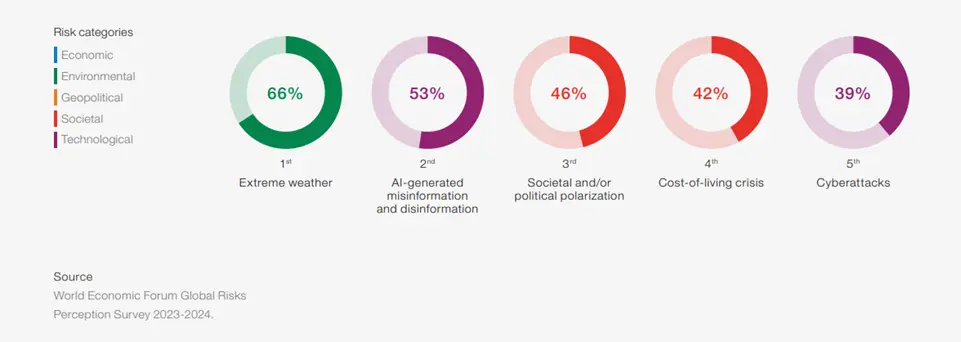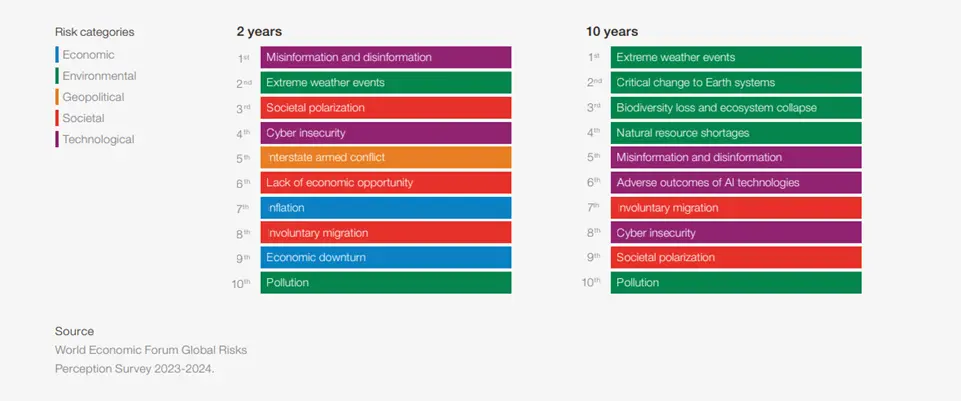February 5, 2024
The beginning of 2024 confronts us with an increasingly complex global landscape, clearly highlighted in the Global Risks Report 2024, published annually by the World Economic Forum (WEF) before the annual meeting held in Davos, Switzerland. The 19th edition was released on January 10.
The report, based on a survey involving 1,490 experts and decision-makers from various sectors worldwide, provides an in-depth map of the major perceived threats that await us in both the short and long term, which could significantly impact society, the economy, and the environment. Misinformation, geopolitical tensions, environmental challenges, and rapid technological advancements emerge as the main obstacles that could disrupt our path.
Let's browse through the pages of this report and try to decipher what the future holds for us in the short and long term.

Figure 1: ranking of perceived most urgent global risks in 2024
The top-ranked risk in the overall ranking is environmental. Two-thirds of the respondents rank extreme weather conditions as the most important risk, which will have severe global repercussions in the next two years and even more in the following decade.

Figure 2: ranking of perceived most impactful global risks in the short and long term
The WEF emphasizes that, in the short term, misinformation presents itself as the most pressing global risk. The distorted use of information has a global impact, not just a local one. Several countries have upcoming elections on their agendas, and in this context, the manipulation of information could further widen social and political divides, leading to consequences ranging from protests to civil tensions.
Another significant threat is social polarization, where opinions, positions, or ideologies within a group of people diverge and shift towards opposite extremes, creating a marked division between different factions of society. This phenomenon has been gaining traction in recent years, infiltrating public debate on crucial issues, from public health to social justice.
Looking ahead, the next decade is dominated by environmental threats. The GRR 2024 warns that natural disasters, biodiversity loss, and the climate crisis could reach a point of no return. Natural risks, particularly related to extreme weather conditions, play a prominent role in experts' perceptions.
An interesting element is the gap in the perception of environmental risk among different groups. Younger survey participants attribute greater urgency to environmental risks in the short term compared to older age groups. Moreover, the private sector considers environmental risks as major long-term concerns, while civil society and government highlight these risks in the short term.
This gap is a clear symptom of how the new generations are more sensitive to sustainability issues and have a greater urgency to mitigate risks that could compromise their future, while companies still tend to postpone environmental issues in favor of their current management and business models, which many still struggle to revolutionize.
The report also highlights the convergence of technological advancements, geopolitical tensions, and conflict risks. AI and emerging technologies could widen the digital divide between high- and low-income countries, creating new disparities in the distribution of benefits and risks. Additionally, geopolitical tensions and the use of frontier technologies raise global security concerns.
The GRR 2024 emphasizes that there are numerous opportunities in local and international actions to significantly mitigate the impact of global risks. Investments, regulations, and collaboration between the public and private sectors can play a crucial role. Innovation, research, and development, along with the collective action of citizens, businesses, and countries, can positively influence risk reduction.
In this critical context, companies play a fundamental role in shaping a sustainable future. They are not just economic actors but also agents of change capable of positively influencing society and the environment.
There are multiple areas where each company can intervene and actions they can implement.
As Progetto Doable, through our services, we are committed to promoting, as an alternative to the competition imposed by the current system, collaboration among companies to develop shared solutions to tackle global challenges.
The goal is to encourage companies to undertake and share sustainable actions with their supply chain, actions that can significantly contribute to mitigating the major risks that threaten our present and future. Here are some:
The Global Risks Report reminds us of the urgency to act to address global challenges. Companies have the responsibility and opportunity to lead the transition to a more sustainable future. Through concrete actions, smart strategies, and collaboration, they can help mitigate the emerging risks and build a more resilient and equitable society for future generations.
The future is in the hands of those who decide to act responsibly and sustainably.
Are we ready to do our part?
